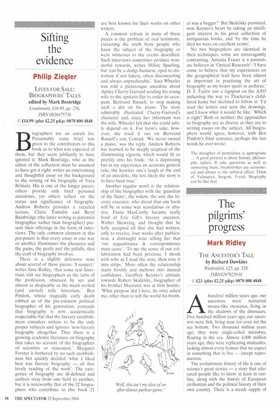Sifting the evidence
Philip Ziegler
LIVES FOR SALE: BIOGRAPHERS' TALES edited by Mark Bostridge Continuum, £16.99, pp. 256, ISBN 0826475736 (t.) £14.99 (plus £2.25 p&p) 0870 800 4848 Biographers are an unruly lot. Presumably some brief was given to the contributors to this book as to what was expected of them, but they seem jubilantly to have ignored it. Mark Bostridge, who as the editor of the collection must be assumed to have got it right, writes an entertaining and thoughtful essay on the background to the writing of his biography of Vera Brittain. His is one of the longer pieces; others provide only brief personal anecdotes, yet others reflect on the status and significance of biography. Andrew Roberts provides a recycled lecture, Claire Tomalin and Beryl Bainbridge (the latter writing as potential biographee rather than biographer) present their offerings in the form of interviews. The only common element in this pot-pourri is that every essay in one way or another illuminates the pleasures and the pains, the perils and the pitfalls, that the craft of biography involves.
There is a slightly defensive note about several of these pieces. 'I suspect,' writes Jane Ridley, 'that some real historians still see biographers as the tarts of the profession, obsessed by sex and almost as despicable as the much reviled (and envied) telly historians.' Ben Pimiott, whose tragically early death robbed us of the pre-eminent political biographer of his generation, contends that biography is now academically respectable but that the literary establishment considers writers to be the only proper subjects and ignores 'non-literary biography altogether. Thus there is a growing academic literature on biography that takes no account of the biographies of scientists or statesmen.' Margaret Forster is bothered by no such snobbishness but quickly decided 'what I liked best was literary biography — all that lovely reading of the work'. The categories of biography are ill-defined and authors stray from one field to another, but it is noteworthy that of the 32 biographers who contribute to this book 21 are best known for their works on other writers.
A common refrain in many of these pieces is the problem of oral testimony, extracting the truth from people who knew the subject of the biography or were witnesses to the events described. Such interviews sometimes produce wonderful rewards, writes Hilary Spurling, but 'can be a dodgy business, open to distortion if not fakery, often disconcerting and always unpredictable'. Sara Wheeler was told a picturesque anecdote about Apsley Cherry-Garrard sending his young wife to the upstairs flat to order its occupant, Bertrand Russell, to stop making such a din on his piano. The story admirably illustrated Cherry-Garrard's character and, since her informant was the wife, Wheeler felt that she could safely depend on it. For form's sake, however, she tried it out on Bertrand Russell's son, Conrad. 'We never owned a piano,' was the reply. Andrew Roberts has learned to be deeply sceptical of the illuminating vignette which would fit so prettily into his book: 'As a depressing but in my experience an accurate general rule, the heartier one's laugh at the end of an anecdote, the less likely the story is to have been true.'
Another regular motif is the relationship of the biographer with the 'guardian of the flame', the widow, the son, the literary executor, who dread that any book will be in some way scandalous or abusive. Fiona MacCarthy became really fond of Eric Gill's literary executor, Walter Shewring, and thought that he fully accepted all that she had written, only to receive, four weeks after publication, a distraught note telling her that 'our acquaintance & correspondence must cease'. `To me the sense of our collaboration had been precious. I shook with sobs as I read the note, then tore it into strips.' More often the relationship starts frostily and mellows into mutual confidence. Geoffrey Keynes's attitude towards Robert Skidelsky, biographer of his brother Maynard, was at first hostile: 'What purpose did I have, he once asked me, other than to tell the world his broth
er was a bugger?' But Skidelsky persisted, won Keynes's heart by taking an intelligent interest in his great collection of antiquarian books, and 'by the time he died we were on excellent terms'.
No two biographers are identical in their techniques, some are extravagantly contrasting. Antonia Fraser is a passionate believer in 'Optical Research': 'I have come to believe that my experiences on the geographical trail have been almost as important in practising the art of biography as my hours spent in archives.' D. J. Taylor saw a signpost on the A303 indicating the way to Thackeray's childhood home but declined to follow it: 'I'd read the letters and seen the drawings, and I knew what it would be like.' Which is right? Both or neither; the approaches to biography are as diverse as they are to writing essays on the subject. All biographers would agree, however, with Ben Pimlott's final sentence, perhaps the last words he ever wrote:
The metaphor of portraiture is appropriate ... A good portrait is about history, philosophy, milieu. It asks questions as well as answering them, brushstrokes are economical and always to the subtlest effect. Think of Velasquez, Sargent, Freud. Biography can he like that.


























































































 Previous page
Previous page